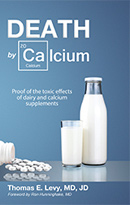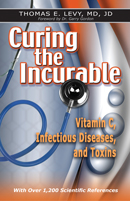The dangers of magnesium deficiency
April 6, 2014 by Dr. Thomas LevyProbably the single most important property of magnesium in the body is its ability to act as a natural biological antagonist to calcium. As most adults have excess calcium throughout their bodies, it is this reciprocal relationship between magnesium and calcium that makes most people in need of regular magnesium supplementation.
In fact, the more you have of one, the less you have of the other. When calcium levels are high in the cells and the extracellular fluids, as they are in most adults, magnesium levels are corresponding low. And, because of this unique relationship, taking regular sizeable doses of supplemental magnesium works to mobilize and excrete calcium – which is one of the healthiest effects that can result to the typical body overloaded with calcium.
The medical myth surrounding calcium
Deficiency of calcium is common in aged bone, but, in contrast to what is believed by many docs and supplement takers, there really is no such thing as a body-wide deficiency of calcium, only normalcy, which is rare, and excess, which is very common.
So what does magnesium do for us?
Just like the class of prescription drugs known as calcium channel blockers, magnesium appears to have the ability to block calcium channels. This ability to block these channels that extend across the cell membranes results in a limitation of the calcium quantity that would otherwise be taken up by the cells – effectively lowering the intracellular concentrations of calcium in the cells throughout the body.
Largely because of this effect on excess calcium inside the cells of the body, supplemental magnesium has been documented to be beneficial in asthma, eclampsia, migraines, hypertension, convulsive disorders, stroke, atherosclerosis, acute myocardial infarction, and inflammation in general.
Increased smooth muscle tone is one common denominator among these conditions, and magnesium, like a prescription calcium channel blocker, can very effectively bring down elevated blood pressures.
Do you suffer with osteoporosis? (Read this)
Because of its unique relationship to calcium, along with its ability to largely normalize calcium metabolism when present in sufficient amounts, magnesium is a very effective anti-osteoporosis agent.
As a monotherapy, it has demonstrated the ability to increase bone density and to decrease fracture incidence. In addition, magnesium can dissolve abnormal calcium deposits outside of the bone and keep them in solution until re-utilized in normal calcium metabolism or excreted in the urine.
It has also been documented to decrease elevated intracellular levels of calcium – a very important component of all chronic degenerative diseases, including cancer. The "flip side," a magnesium deficiency, has been documented to promote abnormal calcium deposition, increase the calcium levels inside cells, initiate the pathology of osteoporosis, and even promote the growth of cancer cells.
What are the other biological effects?
Magnesium has been documented to be a important player in the regulation of insulin action in the body. It has been found to have anti-atherosclerotic effects, and some studies have indicated it plays a role in improving brain function and learning.
Its role as an essential enzymatic cofactor is enormous, as its presence is required in more than 300 different enzymatic reactions. Basically, adequate magnesium levels, within the body, will decrease the chance of dying from anything.
In large studies, magnesium has been documented to decrease all-cause mortality. This means that the effect of magnesium is so important in the body that its deficiency makes all diseased cells sicker, while its restoration improves the health of all those compromised cells.
Although a large body of work has looked at the effect of magnesium in lessening the chances of death from coronary heart disease, some of these studies have also shown, seemingly unintentionally, that it decreases the chances of death from anything.
The very powerful effects of magnesium supplementation were demonstrated exceptionally well in two such studies. Both studies looked at the effects of a continuous magnesium infusion over either a 24 or a 48-hour period, in patients with suspected or established heart attacks.
A total of 22 grams of magnesium sulfate was given in the patients treated for 48 hours. In both studies, the treated patients had a decreased all-cause mortality rate for a full 5 years following the studies.
Few, if any, other medicines, nutrients, or other beneficial agents administered for the general support of good health can be given in any dose for only a period of 1 to 2 days and have such a profoundly positive impact for such an extended period of time.
The best magnesium for human consumption
While there is much more significant information on the positive effects of magnesium supplementation, it is beyond the scope of this brief article. When supplementing any mineral like magnesium, you want to have a supplement form that supplies both a desirable anion along with the cation, in this case magnesium. While not the only good supplemental form of magnesium, my recommendation is magnesium glycinate – which also is supplementing an amino acid that is needed in abundance by the body.
Large amounts of magnesium in any oral form can cause diarrhea, and the individual needs to determine what their bowel tolerance is for the supplementation form that they take. While any amount of magnesium supplementation is good, if the bowels allow it, a desirable supplementation amount would be between 300 to 500 mg.
There is nothing wrong with taking more if you tolerate it, but having the guidance of a knowledgeable doctor would be a good idea – if you want to go higher. And, if you can only tolerate 100 mg, – then still go ahead and take that amount.
References:
http://www.ncbi.nlm.nih.gov/pubmed/?term=12845247
More articles:
June 22, 2013 | Liposome-Encapsulated Glutathione
July 9, 2013 | Root canals are a primary cause of chronic disease
June 27, 2013 | Calcium, the Toxic Supplement
July 28, 2013 | Vitamin C With Vaccinations
August 3, 2013 | Avoiding Digestive Toxicity
August 10, 2013 | The disease causing dangers of high iron levels
August 19, 2013 | Vitamin C better than chemotherapy
September 2, 2013 | The marketing myth of ’vitamin C complex’
September 18, 2013 | Cardiologist speaks truth about cholesterol and statins
October 2, 2013 | Reverse shingles with vitamin C
October 14, 2013 | The effective prevention and treatment of radiation exposure
October 29, 2013 | Undiagnosed scurvy causes widespread disease
November 19, 2013 | Eliminate lead toxicity by consuming vitamin C
November 29, 2013 | New study says high fat diet is healthy
January 1, 2014 | Osteoporosis is much more than calcium deficiency
February 21, 2014 | Vitamin C is the 'muscle' of the immune system
March 11, 2014 | Reversing disease with the 'multi-C' protocol
April 6, 2014 | The dangers of magnesium deficiency
April 11, 2014 | Exposing the truth about liposomal nutrients
July 13, 2014 | Best nutrients to have in your ‘one a day’ supplement
August 3, 2014 | Surprising solution for Ebola virus
October 19, 2014 | Can natural protocols be an effective treatment for Ebola?
November 16, 2014 | Medical warning: Gluten allergies affect everyone
December 5, 2014 | Holistic dentistry pioneer Dr. Hal Huggins dies at 77 but his legacy will live forever
December 23, 2014 | Can a dental infection cause a massive heart attack?
January 29, 2015 | Most cardiologists shocked to discover the true cause of heart attacks
September 2, 2015 | The number one cause for 90 percent of all heart attacks
February 15, 2016 | The most popular vitamin C myths exposed
February 27, 2016 | How to effectively treat viral infections, including Ebola and Zika
March 14, 2016 | The never-ending war against vitamin C
May 22, 2017 | Vitamin C and sepsis: The genie is now out of the bottle
June 22, 2019 | Most cardiologists shocked to discover the true cause of heart attacks
July 3, 2019 | Can a dental infection cause a massive heart attack?
September 30, 2019 | Medical warning: Gluten allergies affect everyone
March 19, 2020 | Best nutrients to have in your 'one a day' supplement
October 30, 2020 | The dangers of magnesium deficiency
About NaturalHealth365
Dr. Levy regularly contributes brief articles of interest to the NaturalHealth365 website, which can accessed here: www.naturalhealth365.com.










